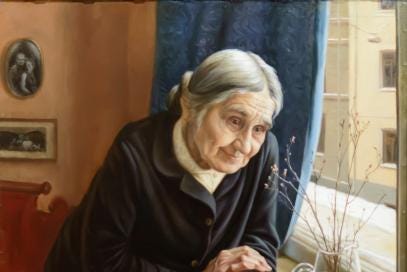There comes a time to die...
Somewhere in Ukraine an Old Woman felt short of breath. A doctor came to her house, listened to her lungs, concluded there was water there, prescribed antibiotics, and left her be.1
The Old Woman lived a long and good life. She was born shortly before the war, survived the siege of Leningrad, and lived with tuberculosis as the reminder of those days.2 She went to Western Ukraine as a specialist to uphold Soviet rule, where she met her husband. He was a Ukrainian nationalist who would have been shipped to Siberia had he not married a Russian to avoid the sad fate of a political prisoner. He took his anger at the Soviet regime on his wife, beating her. “If he beats you, he loves you”, - a Russian saying goes. They had two children who grew up and gave their parents grandchildren. As time went by, love and peace settled in the family, erasing politics. The Old Woman was not a pushover nor a victim. She was a formidable woman, an engineer, who was known for visiting many neighbors to give them various injections once they were discharged home from a hospital.3 The Old Woman’s husband died several years ago, at home, his daughter caring for him in his last weeks when he was bedridden. She was not alone nor abandoned. She lived comfortably with her daughter, son-in-law, and a grandson.
After one week passed, the Old Woman did not feel better. Her daughter called the doctor again. He came, listened to the Old Woman’s lungs, and concluded there was no improvement. He suggested she could go to the hospital, but she would not come out alive, he told the Old Woman’s daughter. The daughter asked her mother if she wanted to go to the hospital. The Old Woman did not. She wanted to stay at home however long she had left. She passed away at peace in her own bed a week later.4
There comes a time to die. It used to be that all people knew it and prepared for it. Today in places where Western medicine is well developed and people believe that death is not a certainty but an option to be negotiated, dying becomes a torture smeared in time. Everybody dies no matter what you do. How you die differs. A swift death was granted to the Old Woman because common understanding of when dying is normal and expected. Every member of the situation played a delicate part. Death was not mentioned. Death is sacred. You do not talk about it.
There was a doctor who did not pursue extensive testing of the causes of “water in the lungs” beyond listening with a stethoscope. He was honest about the reality of going to the hospital at this age yet he did not upset the Old Woman’s days. He spoke to the daughter, not the Old Woman. Nobody wants to hear they will die. Everyone suspects that may be the case but there is no need to bury anybody before their time. There is peace in uncertainty and ambiguity.
There was a daughter who honored her mother’s wish and was willing to share her mother’s last suffering without trying to fix what is not hers to fix.
Importantly, the Old Woman herself knew it was her time and faced the reality of dying without trying to postpone or deny it.
I know of this story as loosely retold by my mother. I am almost certain that the doctor assessed the woman more diligently and had a diagnosis based on the assessment. These details are not told to families thus are not passed on in conversations between friends. The diagnosis is of no importance for this discussion.
Tuberculosis was more common in the USSR than the US now. Certain people were more predisposed to it. Children and youth weakened by war would be in that category in combination with poor nutrition, crowding, and tuberculosis being present in community.
Lay nursing was very common in the USSR and was a way to make extra money.



